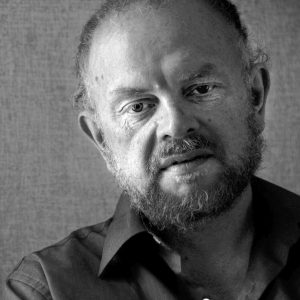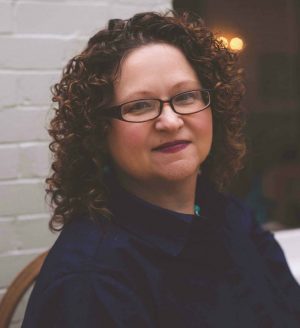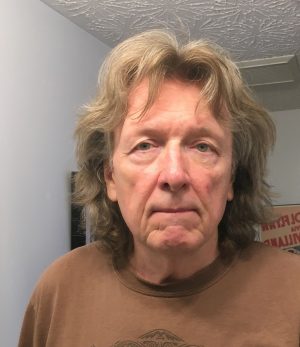The year Maxine turned fourteen she found her true calling, at the cost of two lives.
Maxine spent her childhood mornings at the front window of the crumbling farmhouse where she lived with her brother Brad and mother Joan and her mother’s big bastard of a synthetic-heroin monkey, watching for cars on the road. Whenever one passed, she imagined herself behind its wheel, zooming out of her life with glorious speed, and her heart ached with need.
Maxine knew that, without her, life in the house would fall apart. She needed to feed and clean Brad, kill as many cockroaches and rats as possible, keep the phones powered, stop her mother from choking on her own vomit during the bad highs, and throw rocks at the junkies who lurked in the weedy driveway. That was a typical list of tasks before she left for school. Every two weeks or so, her uncle Preacher came down from the hills and, living his nickname to the fullest, spent hours yelling at her mother to clean up her act. Her mother would groan and shake her head and agree to go straight, only to break that promise once he disappeared back into hiding.
Maxine liked to play the No Crying Game, which goes like this: you run into a wall so hard it knocks you backward, leaving your nerves humming like guitar strings and your mouth salty with blood, but you never cry. If you slam yourself hard enough to chip a tooth or bruise your face, and not a single tear rolls down your cheek, you can stop doing it for a week.
On the fifth of every month their benefits came, and Maxine’s mother would pile them into the family’s rattling wreck of a van for the fifteen-minute trip to Red Junction, where the big grocery store gladly accepted EBT. Maxine loved the store’s bright lights, the aisles lined with shiny packaging, the sleekness and color that reminded her of the cars zipping down the road: signs that someone out there cared enough to do a good job, to make something perfect. Maxine chose not to see how some of the shoppers looked at them with horrified pity, as if they were roadkill.
Maxine’s mother always acted happy in the store. She whistled and told knock-knock jokes as she filled their cart with cereal and the cheapest kelp-meat, which Maxine could stretch far if she mixed it with herbs and roots pulled from the small yard behind the house. When she was sober, her mother was very good at calculating everything down to the cent, in order to prevent the embarrassment of having to leave food on the cashier’s conveyor belt. That happened once, and Maxine’s mother had yelled, and someone called security, and it was only because Maxine acted so cute with the manager that they were ever allowed to come back.
Maxine’s father was in prison forever, thanks to a drug deal gone wrong, and all their relatives were dead except for Preacher, who needed to stay in the hills because the police wanted him in a cell or a coffin, preferably the latter.
Maxine hated the police, especially the two who came around to stand in the weedy yard and call her a waste of life, dangling candy bars as they asked where her uncle was hiding, as if she were stupid enough to give up a blood relative for a sugar rush. Maxine would hiss at them and bare her teeth, but knew to go no further. A friend of hers, Monica Miller from down the road, once bit a cop on the ankle during a scuffle and they hit her in the head hard enough to put her in a coma. Sometimes stuff just happens. It’s a mean world.
The cops called her family rednecks and trash and hillbillies. “You gonna be just like your mama,” one of them liked to tell Maxine, “and your kids gonna be just like you. How you feel about that?”
Maxine always stuck out her tongue at that cop, whose name was Dwight, and who rocked a blonde caterpillar of a mustache. Dwight liked to take out his club and run at Maxine as if he intended bash her brains all over the porch, but she knew to hold her ground.
“You never getting out of here,” Dwight usually said. “You’re just another waste of breath, you ask me.”
Maxine thought of Dwight as an angry possum in a tent, anxious to bite anything trapped in there with it. But deep in her heart, she feared the cop was right. She had no idea of a life other than this one. On the cracked screen of her cheap-ass phone she watched shows where beautiful people in sleek dresses and suits marched through gleaming spires of steel and glass, scenes from New York City that might as well have taken place on a planet far from this one. Her own eyes had never seen anyone in clothes so shiny, or buildings so magical.
When the cops came by, Maxine imagined Preacher watching them from the black trees along the top of the ridge. When the roof collapsed, or some man in a suit threatened to kick them out of the farmhouse, or mother’s EBT card no longer worked at the store, Maxine sent up a silent cry for Preacher to save them, knowing that he would never appear, not until the danger had passed. So she learned to do everything herself.
Maxine was very good around cops until she turned fourteen, and then everything went to hell.
II.
To celebrate her birthday, Maxine took a little joyride.
She had skipped school that morning, choosing instead to hang out on the porch of The Tony Eight with her best friend, Michelle. The Tony Eight was a hard bar but its owner, Tony the Third, kept a counter by the front door stocked with goodies such as candy and burner phones. He let kids use his porch as a chill-out zone (“Better they stay here than go in the woods. They don’t all come back from the woods,” is how he defended that choice) from eight in the morning until five in the evening, when the number of drunks inside reached critical mass, and he only had two rules: no cursing within his earshot, and none of that boy-band crap on the throwback jukebox he kept in one corner.
That Tuesday, Maxine and Michelle had already spent two hours on the wooden steps, smoking cheap Beijing Blue cigarettes and talking boys, when a red Mustang screeched into the bar’s gravel lot. They both tensed, knowing it was Ricky, a local weed dealer who liked his girls a little too young.
Ricky lurched from the car, creepy smile in place, and paused to check his phone before sauntering toward them. Maxine reached into the left pocket of her jeans jacket, palming the small knife she kept there. Even without looking up, she could feel Ricky’s gaze slithering over her legs, and shuddered. Please God, she thought, just make him go away.
God declined to answer, but someone else did. Ricky made it ten yards across the lot when a big black car slithered into view behind him, its lithium-ion motor silent but its tires squealing on the slick road, its passenger window zipping down to reveal a hand with a pistol—pop, pop, pop—and Ricky collapsed, his purple jumpsuit puffing as the bullets punched through his flesh. The black car zipped past the bar before disappearing around the far curve.
Through the open door behind her, Maxine heard Tony the Third curse. Michelle clutched her knees and rocked back and forth, tears rolling down her cheeks. Maxine felt curiously numb, her breathing nice and regular as she stood and walked over to Ricky just as he managed, with a loud grunt, to roll onto his back, his front stained black from moist gravel and probably a quart of spilled blood.
Maxine pulled out her phone and dialed 911. Those calls were free, which was good, because she was running low on minutes this month and didn’t like the idea of burning a few on a piece of crap like Ricky. As she held the phone to her ear, she knelt and began rifling through the pockets of the jumpsuit, removing a wad of pleasingly retro twenty-dollar bills in a gaudy money-clip (bloody), a key-fob attached to a silver dog’s head (ugly), and a brand-new phone (bonus!) with one of those cool bendable screens.
“Some of your dealer friends tracked you down, huh?” she asked Ricky.
“Help…” The sides of Ricky’s mouth bubbled with pink froth. “Help…”
“Nine-one-one’s on hold,” she said, popping open the money clip and flicking through the stained money. “Like, what else is new, right?”
The sight of Maxine rifling the cash shocked a bit of life back into Ricky. His cold hand gripped her wrist and squeezed, as he rasped: “Don’t… take… bitch…”
She smacked him on the forehead with the money clip. “Hold on, the phone’s ringing.” A moment later, the operator clicked to life, asking about her distress, and Maxine cheerfully told her all the gory details about a drive-by shooting at The Tony Eight. That task complete, she called over her shoulder: “Michelle, go inside. Tony got a med-kit.”
Michelle obeyed without backtalk. She was one of those types: prickly as a porcupine on a mega-dose of Heisenberg Blue most days, but a total lamb in a crisis. Maxine knew that Tony kept a fully loaded med-kit behind the bar, next to the shotgun. While she waited for Michelle to return, she helped herself to Ricky’s car keys.
Ricky hissed: “Don’t… take…”
“Look,” she said. “You got shot, but you’re gonna make it.” That was probably a lie, given the amount of blood pumping out Ricky’s holes. “Tony got a good kit. Ambulance be here in a minute. We going through all this trouble for you, means you owe us a favor. So I’m taking a spin in your sweet car over there. Don’t worry, you’ll get it back.”
Ricky tried to spit blood at her and missed.
She slid behind the Mustang’s wheel, unsurprised at Ricky’s choices in tricking out the interior: a blue glow from LEDs beneath the front seats, over-sized speakers that probably cost three times more than the engine, and a steering wheel wrapped in the finest imitation leather. Maxine wrinkled her nose at the near-overpowering stench of cheap cologne and spilled beer as she popped the key-fob into the slot on the dashboard, the gas engine awakening with a roar, the stereo booming vintage rap-rock (classy, Ricky, classy) loud enough to rattle the substandard fillings in her teeth.
Maxine smacked dashboard buttons until the music went quiet, spun the wheel, and gunned the Mustang out of the lot. In the rear-view mirror, she saw the Tony rip Ricky’s jumpsuit open and squirt something from a can into the wounds, but not before giving Maxine a big thumbs-up. What more pseudo-parental approval did she need?
Her first joyride almost went wrong ten seconds in, as she tried to muscle the Mustang’s fat ass into the first sharp turn and almost skidded out, nearly ramming head-on into a truck in the oncoming lane, spinning the wheel to correct and overcompensating, clipping a rusty Stop sign, shrieking in fear and joy as she finally pointed the car’s nose in the right direction and slammed the gas pedal to the floor. The Mustang growled in response and began to eat the miles. It was her first time driving and she was a natural, powering into each curve, feathering the brake at every intersection.
The black car appeared just ahead, and her jubilation curdled into unease. From Preacher she’d learned the first rule of doing crime: you hide after the crime’s been done. So why were they still on the road? She needed to get out of here before they noticed Ricky’s car in their rear view mirror, but they were on a straightaway: no turnoffs, no side-roads.
The black car tapped its brakes. She slowed to keep distance, her dread igniting into outright fear as the car’s front-passenger window buzzed down and the hand with the pistol emerged. She veered the Mustang left just as the gun spat fire, a bullet snapping off her roof.
If she stayed back, the next bullet might smash through the windshield and her forehead. If she stopped, they would turn around and hunt her down. That left her with one choice.
Punching the gas, she rammed her fender into the other car’s trunk, bumping it forward and to the right. The shooter’s head and shoulders appeared above the car roof, silhouetted by the sun, the gun waving as he tried to aim, and she accelerated again until her front tires came parallel with the other car’s rear door and she swung the wheel hard right. With a crunch of metal the other car left the road—a faint scream from the shooter above the boom of two tons of metal rolling into a deep ditch. The wheel slithered hot in Maxine’s hands as she fought for control, finally skewing to a stop in her own lane.
You need to drive away, she thought. Get out of here. No, can’t do that. I need to see if anybody survived. They might come after me.
She eased the Mustang onto the shoulder and climbed out, after wiping her shirttail on the steering wheel and anything else she might have touched. Her hands shook, her knees weak as she tip-toed into the weeds.
The black car had entered the ditch on its side, landing in three feet of oily water. A broken tree-stump jutted through the crumpled steel of the hood. The windshield had cracked but not shattered, and through the webbed glass (Maxine snuck close now, breathing hard, ready for the bullet) she could see the body hunched in the driver’s seat, limp hand on the steering wheel.
She leapt onto the far side of the ditch, and saw the top of the shooter’s head in the water, blonde hair streaming like kelp. No bubbles meant no breathing meant it was safe to come closer, which she did, recognizing the face just beneath the surface:
Her good friend Officer Dwight, his torso pinned beneath the car’s frame.
Maxine’s fear deepened into nausea. She sank to her knees on the wet grass and vomited a neon spray of half-digested junk food.
Get out of here.
Yes, that was the best idea. Wiping her mouth, she stood and walked across the field beyond the ditch, toward the distant band of forest that would give her cover from anyone driving past on the road. Her boots sank into the muck, slowing her progress. Maxine pulled out her phone and made another call.
III.
The inside of the diner was a time capsule, from the fading Trump for President poster on the wall above the old-fashioned cash register, to the deep-fat fryer sizzling away in complete defiance of all state health laws. Behind the register leaned Johnny Oates, whose burning hatred of everything politically correct had led him to create this temple to a fantasy America where everybody enjoyed a God-given right to clogged arteries and blackened lungs.
Maxine entered, checking out the three regulars sitting at the counter, all working doggedly on their eggs and butter-soaked carbohydrates: reddened men, their middle-aged muscles dissolving into fat, their knuckles beaten into scar tissue.
“Hunting’s for wimps,” Oates was telling them, engaging in his favorite pastime of goading customers into an argument. “You’re just killing something can’t shoot back. If I’m going to head out into the woods after something, it’s gonna be a human being.”
At the far end of the counter, Oates’ biggest customer at two hundred ninety pounds, the one and only Perry Parks, trembled and purpled and seemed primed to explode in a fury of grease-fried rage. “You got no idea how difficult it is. The skill it takes. Even for deer.”
“Why don’t you wire a machine gun to a deer’s horns? I mean, that’s a fair fight. Give it the chance to take a few of you with it,” Oates smacked a few buttons on the register. “Jane, you agree with that?”
The waitress in the far booth, eighteen going on forty, e‑cigarette clenched between pillow-puff lips the shade of a ripe plum, lowered her phone and said, in the flattest possible tone: “Whatever.”
Maxine took a seat in the booth furthest away from the action, wondering if Oates and the rest of them could see her sweat. It was an hour after the crash and her hands still shook, so she placed them underneath the table where nobody could see. Oates wandered over, a smile unzipping his face. For all his attempts to sink barbs into his customers’ psychic meat, he was a decent human being. “How’s it going?” he asked her.
“Okay,” she said.
“I’m sorry, darling, but I gotta ask before you order: you got cash?” Oates dropped his voice a few decibels, even though everybody in the diner could still hear him. As Maxine reached into her pocket and tugged out a few bills from Ricky’s wad, she felt her face flush with familiar shame.
From the way his eyebrows arched, she knew Oates wanted to ask where she’d earned that money, before deciding any answer would only lead to grief on someone’s part. “Okay,” he said. “Good. Sorry about that. What can I get you?”
“Coffee,” she said. “Toast is awesome, too.” More than anything else, she wanted to step into a shower and crouch under its hot drool and stare at the drain-cover as if she could somehow shrink and slide down that rabbit-hole into a better life. Barring that, she needed some food in her belly, for the energy to deal with whatever was coming next. After vomiting her stomach into a ditch, all she could handle was something plain.
Oates nodded and headed for the kitchen, returning a few minutes later with coffee. She dumped roughly half the sugar dispenser into the steaming liquid, not caring whether the sweetener was the real deal (unlikely in a place as cheap as this) or one of those synthetics that provided half the taste and all the diabetes and cancer. She drank it boiling-hot, barely noticing how it scorched her tongue, eyes focused on the screen above the counter, where a talk-show host cracked bleak jokes about the latest round of suicide bombings in Seattle.
The food arrived, and Maxine found herself surprisingly hungry. She was chewing the last bit of crust when the bells above the front door tinkled. Preacher walked in like John Wayne in those old movies that Oates loved—only Preacher was more John Wayne than John Wayne, who had been a mirage, a Hollywood actor named Marion Morrison who discovered that, if he held his hips right and aimed a rifle, people would start calling him “sir.” Preacher came through the door looking solid as stone, bringing his own weather with him. Everybody in the place fell silent.
First Preacher flicked the thumb-lock behind him and flipped the old-fashioned sign on the door so it read ‘Closed.’ Next he pulled a plastic bag out of his pocket and walked along the counter and back into the kitchen, collecting phones from everybody. After he tossed the phone bag to Maxine in the booth, he reached into his pocket and pulled out a thick wad of bills and distributed them to all customers and Oates and Jane and the short-order chef.
With those tasks completed, he helped himself to a cup from the ancient coffeemaker behind the register and sat across from Maxine, taking his first sip with a handful of pills from his jacket pocket. His love of medication stemmed from his three years in the military: red painkillers to ease the burning pain in his shoulders, from the shrapnel embedded in the muscle, always followed by two or three blue gelcaps that kept his mind crackling. The Army fed you a steady diet of chemicals that helped you deal with cognitive load, think your way lightning-quick through firefights. The downside came after they discharged you, when you missed that sharpness to your thoughts, even if it came with side effects like sweaty nervousness, paranoia, and the occasional burst of epic flatulence. Preacher kept his prescription filled through a back-channel to the local VA.
Maxine finished chewing, admiring Preacher’s gunslinger gait, smiling at how everybody in the diner resumed their conversations a little too loudly, anxious to show their new guest how they could play it as cool as him.
“You making some trouble on your birthday, kiddo?” Preacher asked.
“I didn’t start nothing,” she said.
“It’s okay. I’m not mad. Just tell me everything.”
“So I’m down at The Tony Eight…”
“Wait, why weren’t you in school?” His cheeks reddening.
Maxine rolled her eyes. “Thought you said you weren’t mad.”
“You need to be in school.”
Maxine sighed. “You know how that place sucks. I learn more reading on my own.”
“You’re not thinking like a gangster, darling.” Preacher cooled down, his lips breaking into a slab-toothed grin. “You don’t show up to school, the so-called authorities notice, they start getting up in your business. You go to school—even if you just sit there and read—it gives you leeway to do whatever else you want in your life. Make sense?”
Maxine didn’t like people correcting her. “Yeah, yeah, yeah.”
“Yeah, yeah, yeah, okay.” Preacher leaned forward and gently pinched her chin, knowing how much she hated lectures like this. “So tell me what happened.”
“I took a joyride, ran into a couple of cops. They’re dead.”
“So my guy said, when you called him. How’d you get his phone number?”
“You gave it to me, remember? Told me use it in an emergency. If you actually owned a phone, I would have called you direct.”
“Yeah, well, he’s got one of those special phones, it’s harder to trace. I can’t figure out how those work.” In Preacher’s world, nobody carried hardware connected to the Internet, or went online without hiding behind lots of electronic voodoo. “My guy, he said it was Ricky’s Mustang ran those dirty boys off the road?”
“Yeah, it was Ricky’s car.”
Preacher looked concerned. “You shoot Ricky?”
“No, the cops did that. I was just hanging out. You ask me, he had a deal with them that went bad, or something.”
“Who knows? Ricky bled out before they made the hospital.” Preacher washed down another pill with his coffee, his eyes humming electric. “I’m going to clear this up. You don’t need to do anything. Hang tight, don’t say anything to anyone, okay?”
She sighed. “I’m sorry. It’s trouble you don’t need.”
Preacher reached forward, his giant paw settling on her small one. “When I was your age, I got in scrapes like this a lot. It’s part of growing up.”
“So this’ll sound kinda psycho.” She smiled a little. “But I liked the driving part.”
“See? Silver lining,” he said. “And here’s the other good thing: no more cop to sniff his little pig-snout around your house. Five-oh knows one of their own was crooked, they’ll be glad to see him disappear. In exchange for all this, though, you owe me a favor.”
She nodded. “Name it.”
“Finish high school, try to go to college, the whole run. You can read your books there. You keep a low profile, you graduate, and if you still want, you can come work for me. We’ll have some fun together. Deal?”
“I go to college, who’ll watch Brad? Or my mom?”
“I will.” Preacher held up a hand, anticipating her argument. “I know I haven’t been great about sticking around. But I’ve started paying the right people, and I got some good folks on my side. I’ll be around more, I swear. So, do we have a deal? Low profile?”
Maxine laughed. “Okay,” she said. “You got a deal.”
Preacher departed, after handing the bag of phones to Oates behind the counter. Maxine finished her coffee and left. Nobody ever found the wreckage of the black car, or Dwight and his partner in crime. No cop ever swung by her family’s little house again.
 In the meantime, please amuse yourselves with this essay by David Wong, from Cracked.com. It reminds me of Jim Goad in his book The Redneck Manifesto, which you should read if you haven't.
In the meantime, please amuse yourselves with this essay by David Wong, from Cracked.com. It reminds me of Jim Goad in his book The Redneck Manifesto, which you should read if you haven't.











